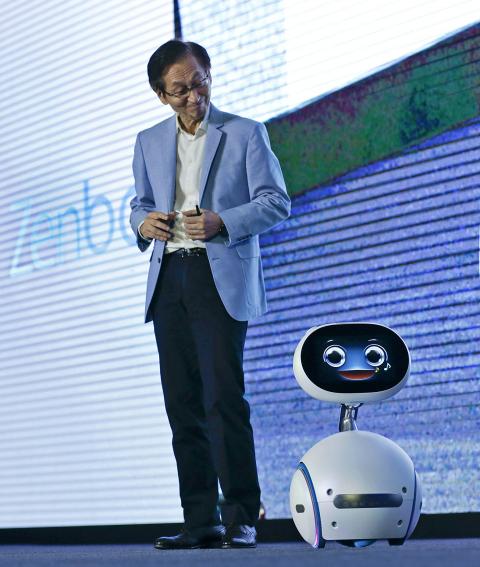Asustek Computer Inc (華碩) yesterday introduced its first voice-controlled home robot as a “smart home manager,” officially tapping into the robotic sector.
“Our ambition is to enable robotic computing for every household,” Asustek chairman Jonney Shih (施崇棠) told a news conference in Taipei.
Zenbo, which is described as a “less-cute, real-world version of Star Wars’ BB-8 droid” by tech news site the Verge, can function as a kitchen assistant, security guard, companion for seniors or children, and a photographer.

Photo: EPA
Shih called on global hardware and software developers to join Asustek’s “developers’ program” to help create applications and content for Zenbo.
“Together we can make Zenbo the best and most practical robot for every household. Together we can work on the next chapter of proactive computing,” Shih said.
Compared with SoftBank Corp’s service humanoid robot Pepper, which is priced at ¥198,000 (US$1,782), Asustek’s home robot is “shorter” and cheaper at US$599.
No release date has been announced.
Asustek chief executive officer Jerry Shen (沈振來) told reporters on the sidelines of the event that Zenbo might not hit the market before the end of the year, as there is “still work to do and some adjustments to make.”
No other information regarding the specifications or manufacturing details of Zenbo were revealed, as Shih declined to take questions from reporters after the news event.
In addition to the introduction of Zenbo, Asustek launched three new models of its third-generation ZenFoen — the ZenFone 3, ZenFone 3 Deluxe and Zenfone 3 Ultra.
The three new models are mainly powered by Qualcomm Inc’s processor, as Asustek has gradually increased adoption of chips by Qualcomm, instead of Intel’s.
The change follows Intel’s withdrawal of its subsidy plan in the first half of last year.
The 5.5-inch ZenFone 3 starts from US$249, a similar price range to the ZenFone 2.
The higher-end 5.7-inch ZenFone 3 Deluxe and 6.8-inch ZenFone 3 Ultra are priced from US$479, a move that indicates Asustek’s attempt to increase the average sale price of its ZenFone.
Shen this month told investors that the company expects its smartphone shipment momentum to pick up significantly in the second half of this year, after the launch of the ZenFone 3 series.
Asustek aims to ship a total of 25 million smartphones this year, up 25 percent from last year’s 20 million, the company said.

Merida Industry Co (美利達) has seen signs of recovery in the US and European markets this year, as customers are gradually depleting their inventories, the bicycle maker told shareholders yesterday. Given robust growth in new orders at its Taiwanese factory, coupled with its subsidiaries’ improving performance, Merida said it remains confident about the bicycle market’s prospects and expects steady growth in its core business this year. CAUTION ON CHINA However, the company must handle the Chinese market with great caution, as sales of road bikes there have declined significantly, affecting its revenue and profitability, Merida said in a statement, adding that it would

RISING: Strong exports, and life insurance companies’ efforts to manage currency risks indicates the NT dollar would eventually pass the 29 level, an expert said The New Taiwan dollar yesterday rallied to its strongest in three years amid inflows to the nation’s stock market and broad-based weakness in the US dollar. Exporter sales of the US currency and a repatriation of funds from local asset managers also played a role, said two traders, who asked not to be identified as they were not authorized to speak publicly. State-owned banks were seen buying the greenback yesterday, but only at a moderate scale, the traders said. The local currency gained 0.77 percent, outperforming almost all of its Asian peers, to close at NT$29.165 per US dollar in Taipei trading yesterday. The

MARKET LEADERSHIP: Investors are flocking to Nvidia, drawn by the company’s long-term fundamntals, dominant position in the AI sector, and pricing and margin power Two years after Nvidia Corp made history by becoming the first chipmaker to achieve a US$1 trillion market capitalization, an even more remarkable milestone is within its grasp: becoming the first company to reach US$4 trillion. After the emergence of China’s DeepSeek (深度求索) sent the stock plunging earlier this year and stoked concerns that outlays on artificial intelligence (AI) infrastructure were set to slow, Nvidia shares have rallied back to a record. The company’s biggest customers remain full steam ahead on spending, much of which is flowing to its computing systems. Microsoft Corp, Meta Platforms Inc, Amazon.com Inc and Alphabet Inc are

RECORD LOW: Global firms’ increased inventories, tariff disputes not yet impacting Taiwan and new graduates not yet entering the market contributed to the decrease Taiwan’s unemployment rate last month dropped to 3.3 percent, the lowest for the month in 25 years, as strong exports and resilient domestic demand boosted hiring across various sectors, the Directorate-General of Budget, Accounting and Statistics (DGBAS) said yesterday. After seasonal adjustments, the jobless rate eased to 3.34 percent, the best performance in 24 years, suggesting a stable labor market, although a mild increase is expected with the graduation season from this month through August, the statistics agency said. “Potential shocks from tariff disputes between the US and China have yet to affect Taiwan’s job market,” Census Department Deputy Director Tan Wen-ling